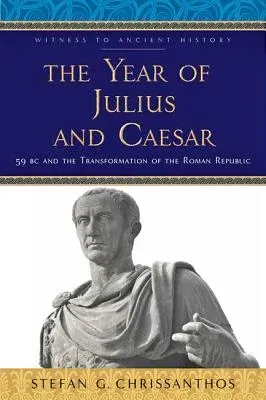How Caesar's attack on Bibulus marked the beginning of the end of the
Roman free state and the descent of the Republic into violence and civil
war.
The year 59 BC--when Gaius Julius Caesar and Marcus Calpurnius Bibulus
served as joint consuls--marked a major turning point in the history of
the Roman Republic. It was a dramatic and momentous time of political
intrigue, bloodshed, and murder, one that boasted some of the most
famous personalities ever to grace the Roman historical stage. Arguing
that this pivotal year demands extended study, Stefan G. Chrissanthos's
The Year of Julius and Caesar is the first focused investigation of
the period.
Chrissanthos uses a single event as his centerpiece: the violent attack
orchestrated by Caesar and the "First Triumvirate" on Bibulus and his
followers in the Forum on April 4. Before that day, he reveals, 59 had
been a typical year, one that provides valuable insight into Roman
government and political gamesmanship. But the assault on Bibulus
changed everything: the consul retired to his house for the rest of the
year, allowing Caesar and his allies to pass legislation that eventually
enabled Caesar to take complete control of the Roman state.
This detailed reconstruction draws on archeological and literary
evidence to describe a watershed year in the history of the late Roman
Republic, establish an accurate chronology, and answer many of the
important historical questions surrounding the year 59. Written in an
engaging and accessible style, The Year of Julius and Caesar will
appeal to undergraduates and scholars alike and to anyone interested in
contemporary politics, owing to the parallels between the Roman and
American Republics.

